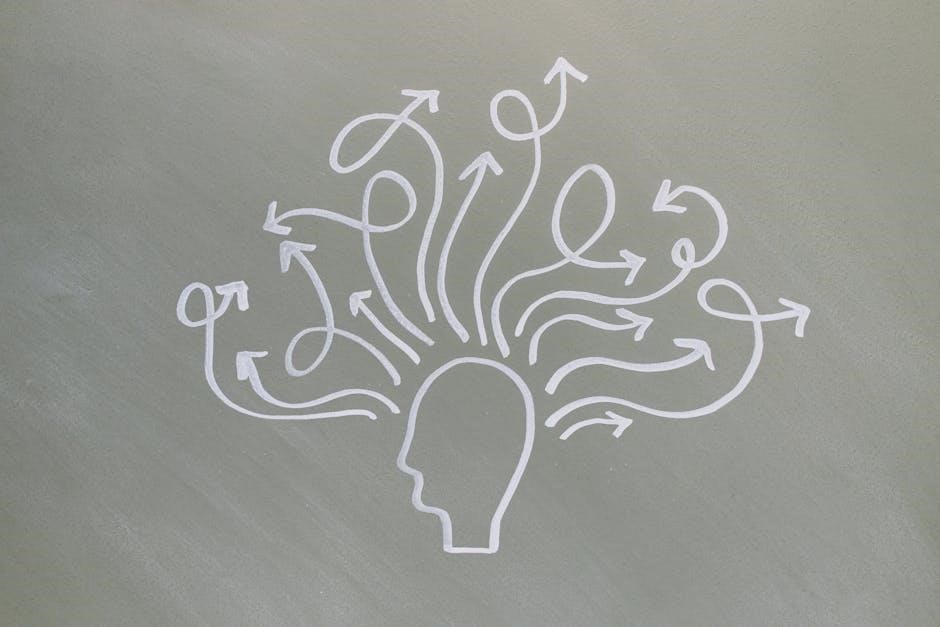
Developmental psychology is a field of study, edited by Richard M. Lerner, focusing on human development, available in pdf format, with various textbooks and resources, including Handbook of Psychology, volume 6, for educational purposes, online.
Definition and Branches
Developmental psychology is a field of study that examines human development across the lifespan, with a focus on cognitive, social, and emotional growth. The definition of developmental psychology is closely tied to its branches, which include child development, adolescent development, and adult development. These branches are interconnected and inform one another, providing a comprehensive understanding of human development. The field of developmental psychology is edited by renowned experts, such as Richard M. Lerner, and is available in pdf format, making it accessible to students and researchers. The Handbook of Psychology, volume 6, is a key resource for understanding the definition and branches of developmental psychology. Additionally, textbooks such as Developmental Psychology, Fourth Edition, by Elizabeth B. Hurlock, provide in-depth information on the field. By exploring the definition and branches of developmental psychology, researchers and students can gain a deeper understanding of human development and its various stages. This knowledge can be applied in various settings, including education and healthcare, to promote healthy development and well-being. Overall, the study of developmental psychology is essential for understanding human growth and development.
Importance of Developmental Psychology
The importance of developmental psychology lies in its ability to inform and improve various aspects of human life, from education to healthcare. By understanding human development, researchers and practitioners can develop effective interventions and strategies to promote healthy growth and development. Developmental psychology is essential for understanding the complex interactions between genetic and environmental factors that influence human development. The field has numerous practical applications, including the development of educational programs and policies that support healthy child development. Additionally, developmental psychology informs the design of interventions aimed at promoting social and emotional learning, as well as preventing mental health problems. The availability of developmental psychology resources in pdf format, such as the Handbook of Psychology, volume 6, has increased access to this important field of study. Overall, the importance of developmental psychology cannot be overstated, as it has the potential to improve human lives and promote healthy development across the lifespan. This knowledge can be used to create positive change and improve outcomes for individuals and communities.

Key Concepts in Developmental Psychology
Developmental psychology concepts include growth, development, and learning, available in pdf format, for educational purposes, online, with various resources, and textbooks, edited by experts, for students and researchers, every day.
Physical Development
Physical development is a crucial aspect of human growth, and it is extensively covered in various developmental psychology pdf resources; These resources provide in-depth information on the physical changes that occur throughout an individual’s lifespan, from infancy to old age. The physical development stage is characterized by significant changes in the body, including the development of motor skills, such as walking, running, and jumping. Additionally, physical development involves the growth and maturation of the brain, nervous system, and other bodily systems. Many developmental psychology pdf textbooks, such as the Handbook of Psychology, volume 6, provide detailed explanations of physical development, including the factors that influence it, such as genetics, nutrition, and environment. By studying physical development, researchers and students can gain a better understanding of the complex processes that shape human growth and development. Overall, physical development is a vital component of developmental psychology, and it continues to be a topic of interest in the field.
Cognitive Development
Cognitive development refers to the process by which individuals acquire, process, and use information, and it is a key area of study in developmental psychology. Many developmental psychology pdf resources, including textbooks and research articles, provide detailed information on cognitive development, including the stages of cognitive development, such as sensorimotor, preoperational, and formal operational. These resources also discuss the factors that influence cognitive development, such as social interaction, culture, and education. Theories of cognitive development, such as Piaget’s theory and Vygotsky’s theory, are also extensively covered in developmental psychology pdf materials. By studying cognitive development, researchers and students can gain a better understanding of how individuals think, learn, and problem-solve, and how these processes change over time. Overall, cognitive development is a critical component of developmental psychology, and it has important implications for education, social policy, and our understanding of human behavior. Developmental psychology pdf resources provide a wealth of information on this topic, making it an ideal starting point for researchers and students.

Stages of Human Development
Human development stages are outlined in developmental psychology pdf resources, covering various life periods, with detailed information available online for educational purposes, including textbooks and research articles every day.

Periods of Human Development

Developmental psychology pdf resources outline various periods of human development, including infancy, childhood, adolescence, and adulthood. These periods are characterized by significant physical, cognitive, and psychosocial changes. The study of human development is a complex and multidisciplinary field, drawing on insights from psychology, sociology, and education. Researchers and scholars have identified distinct stages and periods of human development, each with its unique challenges and opportunities. Understanding these periods is essential for developing effective strategies for promoting healthy development and addressing developmental challenges. Developmental psychology pdf resources provide a wealth of information on these topics, including research articles, textbooks, and online courses. By exploring these resources, students and scholars can gain a deeper understanding of human development and its various periods, from infancy to old age. This knowledge can inform practice and policy in fields such as education, healthcare, and social work, ultimately promoting positive outcomes for individuals and communities.
Factors Influencing Human Development
Developmental psychology pdf resources identify various factors that influence human development, including genetic, environmental, and sociocultural factors. These factors interact and influence one another, shaping the course of human development. Genetic factors, such as heredity, play a significant role in shaping physical and cognitive development. Environmental factors, including family, culture, and socioeconomic status, also have a profound impact on human development. Additionally, sociocultural factors, such as social norms, values, and beliefs, influence development and shape individual experiences. Understanding these factors is crucial for developing effective interventions and promoting healthy development. Developmental psychology pdf resources provide a comprehensive overview of these factors, including their interactions and effects on human development. By examining these factors, researchers and practitioners can develop targeted strategies for supporting development and addressing developmental challenges. This knowledge can inform practice and policy in fields such as education, healthcare, and social work, ultimately promoting positive outcomes for individuals and communities. The study of these factors is essential for understanding the complexities of human development.